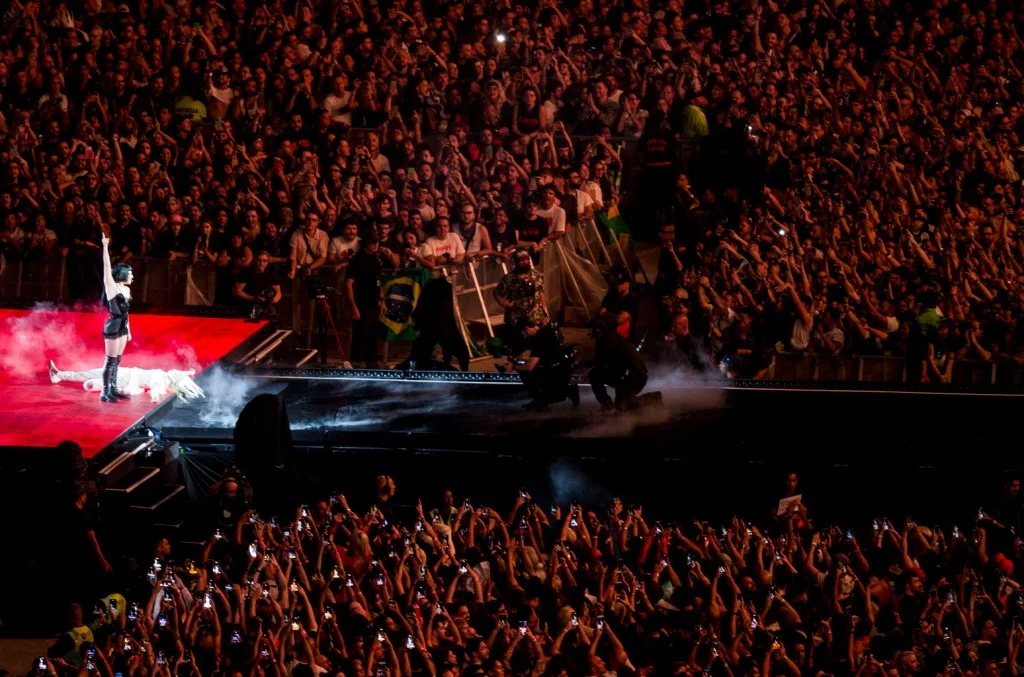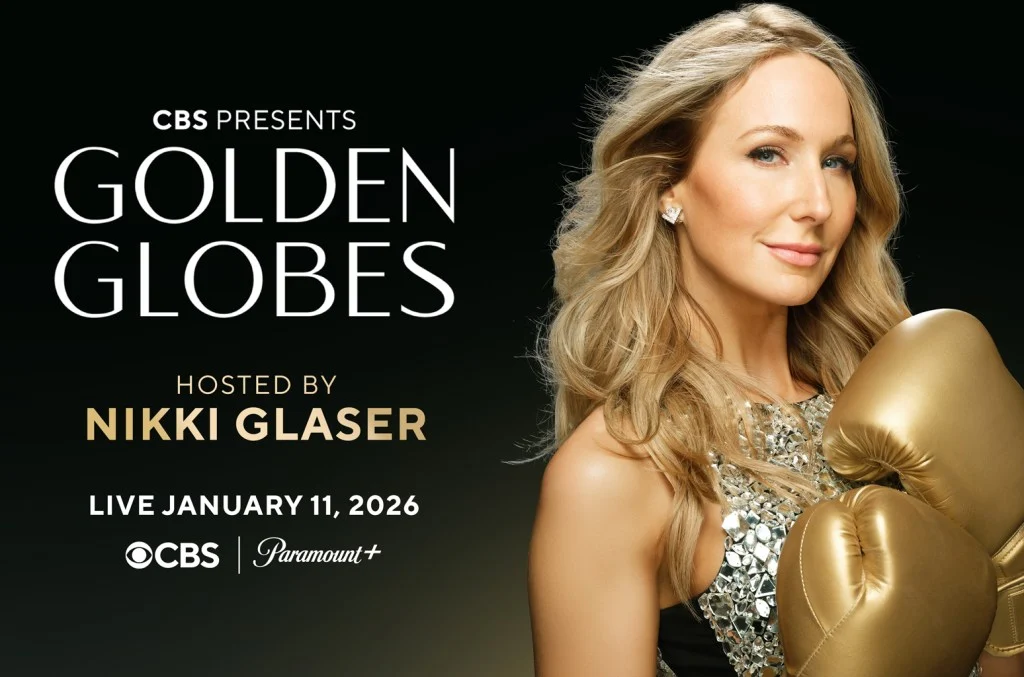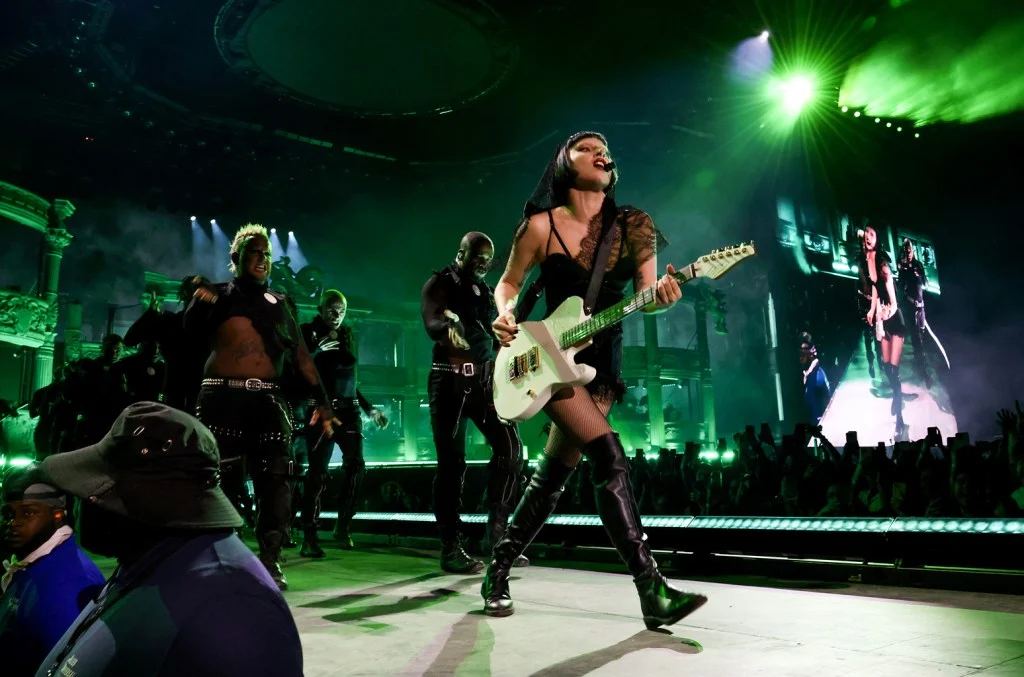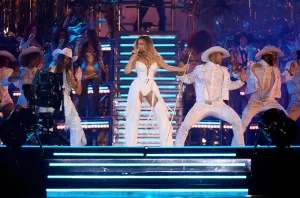Podcasts
Page: 4
The Golden Globes will have a new category at its 2026 show: best podcast of the year. The top 25 podcasts will qualify for the award; there will be six nominees in the category. Full eligibility criteria and additional details will be announced in coming weeks. The 83rd Golden Globes are set for Sunday, Jan. […]

Lady Gaga reportedly played to 2.5 million fans during her concert at Copacabana Beach in Rio de Janeiro, Brazil, on Saturday night. It’s a hard-to-fathom crowd size, considering we’ve never seen anything like it for a concert in the United States. When it comes to free U.S. shows, some estimates put Garth Brooks’ 1997 concert […]
Fat Joe and Jadakiss have joined forces to launch their Joe & Jada podcast. Produced by Colin Cowherd’s The Volume and Roc Nation, the podcast will tackle all things music, sports and culture.
Starting this week, two episodes will be released weekly on YouTube and all major audio platforms. The pair of New York rap titans wear their hearts on their sleeves and are as authentic as they come in the music world. But their in-depth knowledge and respect span plenty of industries outside of the music game, so it only made sense to bring their brash commentary and expertise to the podcasting world.
“My brother Jadakiss and I will be delivering a podcast experience like none other,” Fat Joe said in a statement. “We’re both passionate and opinionated about music, sports, entertainment and culture, so you can definitely expect to get unfiltered analysis, versatile interviews and untold stories. We’re coming to shake up the podcast game and set a new blueprint.”
Trending on Billboard
Fans can expect plenty of special guests to join the pair of diehard New York Knicks fans, with athletes, actors and celebrities from all walks of life sitting down for interviews and embracing debate.
“I’m looking forward to teaming up with Joe on this podcast and showing another side of my personality,” Jadakiss added. “We’ve been friends for a long time, so we have the right chemistry and foundation to make this a really special show. Everyone is finally going to get to hear what we debate and discuss all the time behind the scenes.”
Joey Crack and Jada are no strangers to collaborating. They represented the Big Apple on Ja Rule’s “New York” anthem in 2004, which peaked at No. 27 on the Billboard Hot 100.
“Fat Joe and Jadakiss are legends. Joe & Jada is everything we aim to do at The Volume — bring together strong, authentic voices to create conversations that connect with fans,” said Logan Swaim, who serves as chief content officer at The Volume.
The Bronx native has hosted his show Fat Joe Talks on Starz, but Joe & Jada is the first podcast venture for the duo. Look for the first episode to drop later this week and follow the pod’s official Instagram here.
This April, the Billboard charts have been largely static — with a couple big exceptions, for which we are thankful — but pop music keeps moving. This was a month for big festivals, with two weekends of Coachella and one of Stagecoach all back to back out in Indio, Calif., and of just-as-big tour kickoffs, […]
With the release of Cowboy Carter last year, a lot of noise was made about whether Beyoncé was “country enough” to put out a country album. More than one year (and her first album of the year Grammy) later, the answer is: of course she was. And she’s further proving her genre prowess on the […]
Comedians Matt Rogers and Bowen Yang, co-hosts of the popular Las Culturistas podcast, will host the Las Culturistas Culture Awards, airing Tuesday, Aug. 5 from 9 -11 p.m. ET/PT on Bravo and next day on Peacock. The show will be taped on July 17 in Los Angeles. This show is in its fourth year, but this marks the first time it will be televised.
According to a press statement, “The Las Culturistas Culture Awards celebrates culture’s most iconic and consequential moments of the year. With more than 100 unique award categories, live musical performances and unexpected celebrity guests, this show brings culture’s most crucial moments to life.”
“The word ‘culture’ is defined as ‘the arts and other manifestations of human intellectual achievement regarded collectively,’” Rogers and Yang said in a joint statement. “We are so thrilled to eliminate that whole ‘intellectual’ part entirely with the LCCA’s airing on Bravo and Peacock this August, alongside our partners at Lionsgate. Because while what the world needs now might be love sweet love, it also needs to see an Oscar winning actress and a Real Housewife come together to present a very heavy award to Oprah, if we can book her. Oprah, u up?!”
Trending on Billboard
“We are so happy to bring the vibrant and whimsical Las Culturistas Culture Awards to our Bravo and Peacock audiences,” said Jen Neal, executive vice president, live events and specials, NBCUniversal Entertainment. “Matt and Bowen’s undeniable chemistry, playful humor and love of pop culture’s big and small moments have shaped this spirited award show, redefining what it means to celebrate culture.”
A full list of categories will be announced at a later date.
The Las Culturistas Culture Awards is produced and distributed internationally by Lionsgate Alternative Television. Rogers and Yang serve as executive producers, alongside Lauren LeMieux, Jonah McMichael, 3 Arts’ Olivia Gerke and showrunner Jane Mun.
Rogers, 35, and Yang, 34, have co-hosted the Las Culturistas pop culture podcast since 2016. It won podcast of the year at the 2025 iHeartPodcast Awards in March, which took place at SXSW.
Yang has received four Primetime Emmy nominations for his work on Saturday Night Live – three for outstanding supporting actor in a comedy series and one for outstanding writing for a variety series.
Here’s link to Bravo’s social post featuring a clip from Las Culturistas.

We’ve been talking about it on the Greatest Pop Stars podcast for nearly half a year already, but it didn’t actually get here until last weekend: The Grand National stadium tour, co-headlined by Billboard‘s No. 1 Greatest Pop Star of 2024 (Kendrick Lamar) and our No. 2 Greatest Pop Star of 2023 (SZA) finally began […]
The minute news broke about an upcoming remake of 1992’s The Bodyguard, the first question became: Who could possibly replace late pop superstar Whitney Houston and leading man Kevin Costner as the duo at the center of the romantic thriller? On the new Billboard Pop Shop Podcast, Katie & Keith are discussing some of the […]
Over his 45-year career, Thurston Moore has always comfortably had his feet in two worlds: the song-centric music of Sonic Youth, the pioneering noise rock band he co-founded in 1980, and the experimental world born from his upbringing in New York’s No Wave scene in the late ’70s and early ‘80s.
Explore
See latest videos, charts and news
See latest videos, charts and news
“I really give equal value to composition … that I would give to improvisation,” Moore tells Billboard’s Behind the Setlist podcast from his home in London. “I mean, they really inform each other.”
Moore’s latest album, Flow Critical Lucidity, released in 2024, often splits the difference between keeping to traditional song structure and tossing the rulebook out the window. Moore was joined in the studio by musicians who have performed on his song-based solo efforts: Deb Googe, the bass player for My Bloody Valentine; drummer Jem Doulton and guitarist James Sedwards. Googe and Sedwards also appear on Moore’s 2020 album, By the Fire, 2017’s Rock N Roll Consciousness and 2014’s The Best Day — albums that harken back to Sonic Youth’s more accessible work and Moore’s 1995 solo debut, Psychic Hearts.
Trending on Billboard
But much of his work captures his love of experimental music that took root in the New York music scene in the late ‘70s and early ‘80s. Spirit Counsel, released in 2019, has three expansive tracks that run a total of 2.5 hours. The free-flowing Screen Time, released in 2021, was fittingly released on Southern Lord Records, the home of drone metal band Sunn O))).
This month, Moore premiered Guitar Explorations of Cloud Formations at the New Music Dublin festival in Dublin. He was joined by Googe, Doulton and guitarist Jennifer Chochinov, one half of the London-based duo Schande. A suite in nine pieces, Cloud Formations is “very lengthy, repetitive, immersive guitar, sort of drone pieces,” says Moore, “because I wanted to have that kind of elemental nature to them as opposed to being more song-centric.”
Recording and performing a variety of music creates some uncertainty, though, among promoters, retailers and fans. So, Moore is careful to draw bright lines between his different styles to eliminate confusion. Before his recent shows in New York City and Philadelphia, he asked the promoters to make clear that fans would see an experimental trio featuring percussionists Willie Winant and Tom Surgal, not the band that recorded Critical Flow Lucidity. When he performs songs from Critical Flow Lucidity, he wants fans to know they’re not going to see free-form guitar improvisation. And although he could release a torrent of music, Moore is careful to flood the market.
“I realize that there’s a bit of a responsibility,” he says. “I mean, I know people who I associate with who are musicians who release music every week on Bandcamp, and they’re just constantly recording, releasing. And in some ways, I hold myself back from doing that. I mean, I have gotten into this situation through the years where I want to do a tour and the promoters are like, ‘Well, you were just here playing noise improv in some basement in Paris. So we don’t feel like we can actually book you right now, because the audience is confused.’ Like, what are you going to do? And so that has been a bit of an issue. It’s like, are you going to do your band? Are you going to be playing proper quote-unquote songs, which there’s much a bigger audience for? Or are you going to come here and play with some electronic noise guy? And so I understand that. It’s difficult for the other people involved who are presenting your gig, particularly promoters, because they don’t know how to promote it, and so I’m a bit careful.”
His desire to push boundaries — and his seemingly never-ending supply of friendships with influential musicians — finds Moore collaborating with some prominent names. Last year, for example, Moore performed a free improvisation set with former Led Zeppelin bass player John Paul Jones at the Big Ears Festival in Knoxville, Tenn., and later in London (joined by drummer Steve Noble at one gig). The Big Ears performance was “extremely polarizing” for anybody who expected to hear a cross between Led Zeppelin and Sonic Youth.
“It was just pretty jarring. It was like creating this kind of sound world of improvised noise music. And the place was just jammed. Everybody wanted to see this. And then I think within 30 minutes, it was half full, and I think maybe people got the idea that we weren’t going to be playing any tunes. We were just into this other thing, which we really wanted to do. And we did it, and I really loved it. I have actually mixed down the session. I’d love to put it out some day.”
Three musicians Moore is unlikely to perform with are his Sonic Youth bandmates: Kim Gordon, Lee Renaldo and Steve Shelley. From Oasis to Pavement, many rock bands from the ‘90s have capitalized on nostalgia and the longevity of their brands by returning to the stage. While Moore doesn’t exactly rule out a Sonic Youth reunion, he says isn’t motivated by the payday and believes the band’s legacy stands firm without one. “We covered so much territory that I don’t feel like it was a story left on untold. I think it really had a nice trajectory, and it certainly doesn’t feel unfinished to me.”
Listen to the entire interview with Thurston Moore in the embedded Spotify player below, or go to Spotify, Apple Podcasts, iHeart, Amazon Music, Podbean or Everand.
This week, Billboard is publishing a series of lists and articles celebrating the music of 20 years ago. Our 2005 Week starts here with a discussion of 50 Cent’s game-running 2005 — possibly an even higher commercial and cultural peak than his hallowed 2003 run, but also the clear beginning of the end for his superstardom.
Explore
Explore
See latest videos, charts and news
See latest videos, charts and news
With his inescapable Get Rich or Die Tryin’ album and its Billboard Hot 100-topping smash “In Da Club,” 50 Cent became the hottest rapper in the game in 2003, matching even his mentor Eminem for ubiquity and cultural dominance. After expanding his G-Unit empire in 2004, 50 returned in 2005 with his second album The Massacre, a couple smash collabs with his new West Coast lieutenant The Game, a huge tour with Eminem, new business ventures, new beefs, and even a film debut in his very own prestige quasi-biopic. He was arguably bigger than ever — but after two years where it felt like 50 couldn’t miss, his strike rate was finally starting to slip a little.
In this week’s Vintage Pop Stardom episode of the Greatest Pop Stars podcast, host Andrew Unterberger is joined by a pair of Billboard Hip-Hop staffers and GPS regulars in Carl Lamarre and Michael Saponara to talk about the year that ended up being the top of the rollercoaster for the artist born Curtis Jackson. We start at with 50 playing kingmaker with his G-Unit crew in late 2004, including those couple classics alongside The Game, and then move into his ’05 — beginning with an album that sells over a million copies in its (abbreviated) first week, launches feuds with half of the hip-hop world and returns him to the top of the Hot 100 with his second straight lead single smash, and ending with a film debut that doesn’t totally do any of the things he hopes it will.
Trending on Billboard
And of course, along the way, we ask all the big questions about 50 Cent’s too-big-to-fail sophomore campaign: Could 50 and Game have been the Dre and Snoop for another generation? Is a “Candy Shop” even really a thing? Were the deep cuts on The Massacre better than the singles? Was 50 Cent: Bulletproof worth playing? Can you actually hoop in G-Unit sneakers? And if you catch the Get Rich or Die Tryin’ movie on cable, should you bother sticking around for the whole thing?
Check it out above — along with a YouTube playlist of some of the most important moments from 50 Cent’s 2005, all of which are discussed in the podcast — and subscribe to the Greatest Pop Stars podcast on Apple Music or Spotify (or wherever you get your podcasts) for weekly discussions every Thursday about all things related to pop stardom!
And as we say in every one of these GPS podcast posts — if you have the time and money to spare, please consider donating to any of these causes in the fight for trans rights:
Transgender Law Center
Trans Lifeline
Gender-Affirming Care Fundraising on GoFundMe
Also, please consider subscribing to the trans legislation journalism of Erin Reed, and giving your local congresspeople a call in support of trans rights, with contact information you can find on 5Calls.org.

 State Champ Radio
State Champ Radio 








